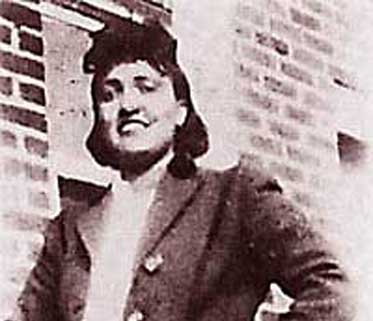Serendip is an independent site partnering with faculty at multiple colleges and universities around the world. Happy exploring!
Notes Towards Day 20 (Th, Mar. 29): Seeking Immortality

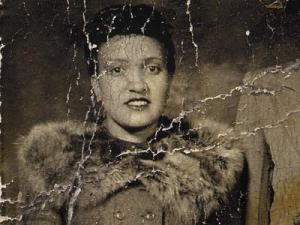 |
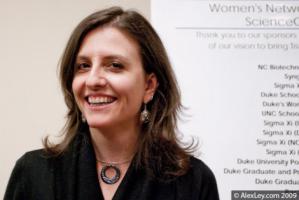 |
I. coursekeeping
beginning this afternoon @ Swat: The TriCo Re: Humanities Symposium:
along with student presentations, the symposium will
include public lectures by two distinguished scholars:
Alexandra Juhasz will open the symposium with her presentation
on “Teaching and Learning as Making: Repurposing Social Media
Spaces” on Thursday, March 29, at 4:30 p.m., in Kohlberg 116
at Swarthmore. She is a media-studies professor at Pitzer College
and is known for her recently published “video-book,” Learning from
YouTube. Juhasz has a Ph.D. in cinema studies from NYU and
has taught courses at Swarthmore, Bryn Mawr, Claremont
Graduate University, and Pitzer College on YouTube, media
archives, activist media, documentary, and feminist film.
Katherine Harris will present a keynote address about digital
pedagogies called, “Doing the Risky Thing: Playing Around
in Digital Humanities,” on Friday, March 30, at 1:15 p.m., in
Kohlberg 116 at Swarthmore. She is a professor of English
and comparative literature at San Jose State University and
has been named to the Council on Digital Humanities for the National
Institute of Technology in Liberal Education for her work in chronicling
her teaching adventures in a March 2011 blog called, “A Day in
the Life of Digital Humanities.”
don't forget our Sunday night posting conversation.....
(blogging from the conference would be great....!)
For Tuesday, read all of Kurt Vonnegut's 1969 novel, Slaughterhouse-Five
[or, since we agreed that we can "get these stories different ways,"
some of you may want to watch the movie instead/also...]
with continued attention to questions of genre: fiction/non-fiction....
what differentiates it from Skloot's book (consider, for example, her
relation to Henrietta, or Deborah, in comparison to his to Billy Pilgrim...);
it will be a rich addition to our discussions of truth and fiction....
II. gathering together/pausing on some
of our insights from Tuesday's discussion-->
I left w/ two importantly unanswered questions:
* why talk about genre, if "policing" fact/fiction/truth/lies isn't productive?
(training ourselves to be more careful readers?
watch for the embedded instructions on "how to read"?)
* how important is intentionality (=the goal of telling the truth/
representing the world as it is) if we mostly don't know what our
brains are doing/thinking....if most of our actions are not intentional?
Alica's afterclass musings: I wonder if her desire to tell the
readers about her investigation was genuine...
Cf. Patricia Hampl. "Memory and Imagination. I Could Tell You Stories:
Sojourns in the Land of Memory (New York: Norton, 1999): 21-37.
p. 25: "no memoirist writes for long w/out experiencing an
unsettling disbelief about the reliability of memory"
p. 26: "My desire was to be accurate. I wished to embody
the myth...Yet...memory is not a warehouse of finished
stories, not a gallery of framed pictures."
p. 28: "intentionality is [not] running the show...writing is
...more telegraphic and immediate in its choices than...logic and
rational intention suppose. The heart, the guardian of intuition
with its secret, often fearful intentions, is the boss. Its commands
are what a writer obeys--often without knowing it."
p. 32: "What is remembered is what becomes reality."
p. 36: "There may be no more pressing intellectual need in
our culture than for people to become sophisticated about
the function of memory."
Not a Memoir: The dishonesty inherent in memoir, [Emily Fox Gordon]
argues, is that an entire life cannot be contained in one book, and so
the writer is forced to follow only one story line...“It was no sin against
literature to write as if the story of my life in therapy had been the story
of my life,” she writes. “But I think it may have amounted to a sin against
myself, or a sin against my life, or — more accurately yet — a sin against
the true story of my life, the one I can never tell and never know.”
Cf. also Horst Zander, "Factional Discourse." Fact-Fiction-"Faction": A Study
of Black South African Literature in English (Narr, 1999): 403-407.
p. 403: attempt to create intermediate terms and categories between
the poles of fiction and fact: post-fiction, surfiction, critifiction, transfiction,
fictual: "where the factual is not secure or unequivocal"
p. 404: "bi-referential," "news/novel discourse," "factifiction" --
attempts at disclosing the fictional quality of reality; cf.
political credo of South African faction
p. 405: conscious aim @ abolishing difference between the modes
(cf. evolution of early English "novel")
p. 406: "factional" a concept w/ blurred edges, overlaps with
more extreme fictionalized factual and factualized fictional pieces
conscious attempt to diffuse the differentiation: to annul the
Western aesthetic w/ division of labour between modes
Cf., too, a story from the EnviroHistory course I attended on Tuesday:
a '75 novel of eco-terrorism called The Monkey Wrench Gang,
important in Env'l History (about the "finest fantasy" of
eco-warriers in the west: blowing up the Glen Canyon
Dam in order to "liberate" the Colorado River...) begins,
"It's a true story. It all happened. Precisely one year from today."
i.e. is it possible to tell a true story about the future?
does truth have a temporal dimension? [can it only refer to the past?]
See also, just in from Wil, the amazing New Yorker piece by Jonah Lehrer,
The Truth Wears Off... (linked too in course forum; will lead off w/ this on Tuesday...)
Consider, too, this insight from a Swat sociologist:
"there is no immaculate perception:
all understanding comes to us via systems of meaning"--
either through explicit ideologies, or (more powerfully)
through tacit, taken-for-granted, authoritative, naturalized,
unquestioned paradigms = hegemonies
This may describe the usefulness (and limits)
of disciplinary (generic?) framings,
the difference it makes that you
are reading this text in THIS course...
If all knowledge is context-dependent,
how would you read this book differently, in a different context?
Summing up some of my own [earlier] thoughts on these questions:
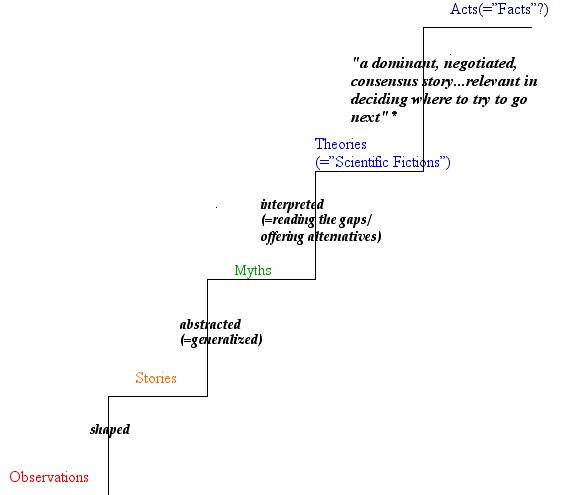
***footnote on how a "fact" becomes an "act": it's a recuperation of "fact" from the O.E.D., where (in the first four instances) it means "act" (from L. fact-um, thing done; was adopted as "feat"). It's fact as act that I want to highlight, fact as action which most interests me: fact as praxis, pusher, mover, provocateur....a fact, I'll go so far as to provocatively claim, is that which has the power to cause action. It's not just any one of an infinite number of stories, but only the story with the punch (perhaps it's the punch that fiction lacks?)....a fact is that which moves things along. Until the ball stops rolling, and is replaced by another...
Call out a fact [from ILHL].
Call out a fiction [ditto].
Theorize/generalize the difference/connections:
How much "fact" was embedded in our fictions?
How much "fiction" was used to express our facts?<
notes clearly labeling what was fiction and what wasn't (252)
This book was intensively fact-checked (332)
[and yet]
If you believe the Bible is the literal truth, the immortality
of Henrietta's cells makes perfect sense (296).
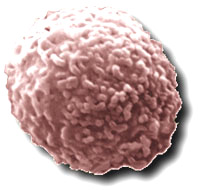 |
III. Today, we're focusing on Part III of Skloot's book,
in cf. to the Law and Order episode, "Immortal"-->
and considering (@ least two types of) "Immortality"
We "should" be sure, first, to have that much-
promised discussion on the ethics of "tissue rights."
How you should feel about this isn't obvious (316-17)
removed tissues = waste (205)
factually incorrect: HeLa cells related to Henrietta/
DNA no longer genetically identical (216)
consent issue overshadowed by a public responsibility
to science: "morally obligated to allow bits and pieces
to be used to advance knowledge to help others" (320-1)
N.B.: a June 2010 report on how Johns Hopkins now
deals with tissue culture and navigates
patient confidentiality while pursuing medical research:
Immortal Cells, Enduring Issues
thinking about the genre of popular science writing
Brown Bag Discussion on Science's Audiences:
a "scientific fact" moves from the laboratory into the social world
through multiple levels of filtration, discussion, conversation,
translation, and adaptation to accessible language. Science
legitimized itself by becoming a public activity --a process
of negotiation in which the acquisition of "virtual audiences"
was essential. In this process of virtual witnessing, "not in front
of the air pump," (for example) Boyle had to use descriptions to
convince his audiences of what he had done. But those
audiences were actors with their own agendas, interpretations
and reactions; a feedback process was thereby initiated, and the
explanations changed in reaction to audience response.
how translatable are science's understandings?
Reading Notes, continued
180: Hopkins had part of Henrietta alive and scientists everywhere
were doing research on her..."part of her was still alive"
184: time of great flux in research oversight..filled with
"widespread confusion about how to assess risk,"
as well as "refusal to cooperate" and "indifference"
187: What constituted "injury" and "risk" was heavily debated
188: if the parts of her mother they were using in
research could actually feel the things scientists were doing to them
189: "we never thought at that time they did not understand"
201: "I was the cell line, like a piece of meat"
Nothing biological was considered patentable until ... 1980
203: Essential Biologicals... many have since turned their bodies
into businesses ....the first person to legally stake a claim to
his own tissue and sue for profits and damages
![]()
If tissue samples became patients' property, researchers
taking them without getting consent and property rights
up front would risk being charged with theft.
205: the definitive statement on this issue: When tissues are
removed from your body...any claim you might have had to
owning them vanishes...you abandon them as waste, and
anyone can take your garbage and sell it..."transformed" into
an invention...the product of "human ingenuity" and "inventive effort"
211: "I just thought [the family] might make some interesting color
for the scientific story."
213: Henrietta's family have their own theories... the Lord's
way of punishing Henrietta for leaving home...all disease
was the wrath of the Lord
215: HeLa was no longer human. Cells change while growing
in culture... become a separate species.
216: it's factually incorrect to say that HeLa cells are
related to Henrietta, since their DNA is no longer
genetically identical to hers .... "it's much easier to do
science when you disassociate your materials from
the people they come from."
216-7: normal human cells... can't grow indefinitely... they
divide only a finite number of times.... Only cells that had
been transformed by a virus or a genetic mutation had the
potential to become immortal.
224: many questions and moral and ethical issues
surround the "birth" of HeLa, and the "death" of Mrs. Lacks....
questions of whether or not permission was received
from the "donor"...for the "use" of HeLa
237: the line between sci-fi and reality had blurred years earlier
247: "I think them cells is why I'm so mean .... I had to start
fightin before I was even a person ...I kept them cancer
cells from growin all over me while i was inside"
252: With each packet, I sent notes...clearly labeling
what was fiction and what wasn't
262: "Her cells caused millions of collars in damage.
Seems like a bit of poetic justice"..." my mother was
just getting back at scientists for keepin all them secrets...."
265: "HeLa is all just cancer"
295: "Those cells are Henrietta."
296: If you believe the Bible is the literal truth,
the immortality of Henrietta's cells makes perfect sense.
298: "maybe if I understood some science, then the story
about my mother and sister wouldn't scare me so much"
308: "She's in a better place now...now she's happy."
Afterword
316-7: How you should feel about this isn't obvious.
They're using issue scraps you parted with voluntarily.
Still, that often involves someone taking part of you.
And people often have a strong sense of ownership
when it comes to their bodies .... but a feeling of
ownership doesn't hold up in court. When they're
part of your body, they're clearly yours. Once they're
excised, your rights get murky.
318: tissue-rights activists
320: "conscientious objectors in the DNA draft"
320-1: the consent issue is overshadowed by
a public responsibility to science: "I think
people are morally obligated to allow their
bits and pieces to be used to advance
knowledge to help others."
321: "Science is not the highest value ...
autonomy and personal freedom"
322: most individual cell lines and tissue samples
aren't worth anything on their own. Their value for
science comes from being part of a larger collection.
325: "It's interfered with science... it's changed the spirit."
Now there are patents and proprietary information where
there once was free information flow.
327: "the fundamental problem here... is the notion
that the people these tissues come from don't matter."
Acknowledgements
330: re-creating the life of Henrietta Lacks
332: This book was intensively fact-checked.
333: the importance of communicating science to the general public
336: every good novel... with a disjointed structure...
I devoured while trying to figure out the structure of this book

